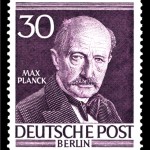Max Karl Ernst Ludwig Planck, FRS, a German theoretical physicist
Biographical Overview
Born in Germany, 1858-1947 Physicist Developed the quantum theory
Awards
Nobel Prize, 1918
Lorentz Medal, 1927
Copley Medal, 1929
Goethe Prize, 1945
Worldview
Using a biblical worldview perspective, Planck successfully applied the scientific method to investigate the laws of nature, His worldview is notable from what he said –
“Religion and science demand for their foundation faith in God.”
“There can never be any real opposition between religion and science; for the one is the complement of the other. Every serious and reflective person realizes, I think, that the religious element in his nature must be recognized and cultivated if all the powers of the human soul are to act together in perfect balance and harmony. And indeed it was not by accident that the greatest thinkers of all ages were deeply religious souls.”
“Both religion and science need for their activities the belief in God, and moreover God stands for the former in the beginning, and for the latter at the end of the whole thinking. For the former, God represents the basis, for the latter – the crown of any reasoning concerning the world-view.”
“Religion represents a bond of man to God. It consists in reverent awe before a supernatural Might [Macht], to which human life is subordinated and which has in its power our welfare and misery. To remain in permanent contact with this Might and keep it all the time inclined to oneself, is the unending effort and the highest goal of the believing man. Because only in such a way can one feel himself safe before expected and unexpected dangers, which threaten one in his life, and can take part in the highest happiness – inner psychical peace – which can be attained only by means of strong bond to God and unconditional trust to His omnipotence and willingness to help.”
“It is the steady, ongoing, never-slackening fight against skepticism and dogmatism, against unbelief and superstition, which religion and science wage together. The directing watchword in this struggle runs from the remotest past to the distant future: ‘On to God!’”
“Under these conditions it is no wonder, that the movement of atheists, which declares religion to be just a deliberate illusion, invented by power-seeking priests, and which has for the pious belief in a higher Power nothing but words of mockery, eagerly makes use of progressive scientific knowledge and in a presumed unity with it, expands in an ever faster pace its disintegrating action on all nations of the earth and on all social levels. I do not need to explain in any more detail that after its victory not only all the most precious treasures of our culture would vanish, but – which is even worse – also any prospects at a better future.”
“But the value of religion exceeds the individual. Not only every man has his own religion but the religion requires its validity for larger community, for nation, race, and the whole mankind. Since God reigns equally over all countries of the world, the whole world with all its treasures and horrors is subdued to Him.”
During World War II, in February 1945, Planck’s son Erwin was executed by the Nazis for participation in an unsuccessful attempt to assassinate Adolf Hitler. On 14 March 1945 Planck wrote in a letter to his friend Anton Kippenberg:
“If there is consolation anywhere it is in the Eternal, and I consider it a grace of Heaven that belief in the Eternal has been rooted deeply in me since childhood.”
“God protect and strengthen you for everything that still may come before this insanity in which we are forced to live reaches its end.”
“That God existed before there were human beings on Earth, that He holds the entire world, believers and non-believers, in His omnipotent hand for eternity, and that He will remain enthroned on a level inaccessible to human comprehension long after the Earth and everything that is on it has gone to ruins; those who profess this faith and who, inspired by it, in veneration and complete confidence, feel secure from the dangers of life under protection of the Almighty, only those may number themselves among the truly religious.”
“Yet in the whole of the universe there is no force that is either intelligent or eternal, and we must therefore assume that behind this force there is a conscious, intelligent Mind or Spirit. This is the very origin of all matter.”
“Farsighted theologians are now working to mine the eternal metal from the teachings of Jesus and to forge it for all time.”
On the complementary nature between science and religion, Max Planck observed:
“The one does not exclude the other; rather they are complementary and mutually interacting. Man needs science as a tool of perception; he needs religion as a guide to action.”
Max Planck


